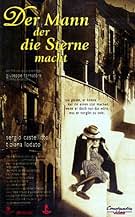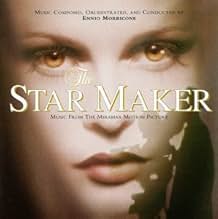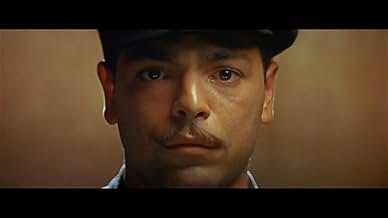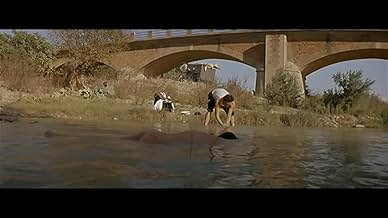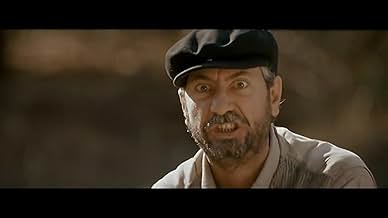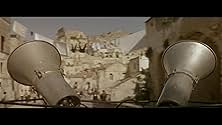IMDb RATING
7.3/10
5.7K
YOUR RATING
A photographer and the types of people he encounters.A photographer and the types of people he encounters.A photographer and the types of people he encounters.
- Nominated for 1 Oscar
- 13 wins & 16 nominations total
Featured reviews
A fast-talker rolls through postwar Sicily selling the dream of movie stardom, and in the process uncovers the desires and desperation of the townspeople. Like a patent medicine salesman, he seduces them with the magic of cinema, more potent than anything from a bottle.
Be prepared for the movie to seduce you, too, with its gorgeously chiseled Sicilian landscapes and faces viewed through the soul-baring lens. It gives a good view of the toughness of Sicily, and every frame has a visual richness typical of Italy itself. If you listen hard, you can make out the Sicilian accent -- even if you don't speak Italian. You'll be able to predict some of what happens, but not all, and the characters and their profiles will linger with you longer than you might expect.
Be prepared for the movie to seduce you, too, with its gorgeously chiseled Sicilian landscapes and faces viewed through the soul-baring lens. It gives a good view of the toughness of Sicily, and every frame has a visual richness typical of Italy itself. If you listen hard, you can make out the Sicilian accent -- even if you don't speak Italian. You'll be able to predict some of what happens, but not all, and the characters and their profiles will linger with you longer than you might expect.
The Star Maker tells such a simple story that I was puzzled as to why its emotional impact grew long after I had seen it. It relates a series of encounters of con man `Dottore' Joe Morelli (Sergio Castellitto) with his marks. Like all con men, he sells dreams, in this case dreams of stardom, and some of the emotional power derives from the universal appeal of this con. In part the power lies in the cinematography of contrast and illusion. The contrast of the physical beauty of Sicily with its poverty alone is sufficient to grab your attention. But the most powerful contrast is seen in the faces of the Sicilians during their screen tests. Giuseppe Tornatore magically captures the hopes and the desperations of his would-be stars as they appear before the `Dottore's' camera. They have two minutes to sell themselves and to escape their destiny of poverty and capture their life's ambitions. Then there is the hero's moral dilemma. This is an `everyman' story; `il Dottore' is another poor guy who does what he can just to get by. He grabs our sympathy by demonstrating sympathy for his marks and by making some exceptional decisions along his way. While I was watching, it appeared to be no more that a series of loosely connected tales. Soon afterwards, the complexity and the moral strengths of the tale grew on me and continue to pleasantly persist.
A seemingly heartless con-man (Sergio Castellito) goes around post-World War II Sicily filming most everyone, for a price, and leads villagers to believe that he is a talent scout for a film studio. Naturally many flock to the apparently kind stranger and do what they can to escape lives of poverty and unhappiness. Castellito meets up with many vivid characters, but none more so than the beautiful Tiziana Lodato (in her first screen role). Soon the young lady is begging Castellito to take her to the land of movie-making and in the process he falls in love with her and acquires a conscience. Apparently he may change his ways and then again maybe not, but it becomes very clear that the local authorities may catch up to Castellito before the film runs its course. "The Star Maker" was a Best Foreign Language Film nominee at the Academy Awards in 1995. Co-written and directed by horribly under-rated Italian film-maker Giuseppe Tornatore (who struck Foreign Language Oscar gold in 1989 with "Cinema Paradiso", one of my all-time favorite pictures), "The Star Maker" is a flawed work because of a strange tone that makes it an uneven experience at times. Humorous situations early point the way to a free-wheeling comedy, but soon drama sneaks in and by the end the drama has literally chased the early comedic routines away. The performers come and go, but Lodato's appearance about half-way through was enough to put the movie over the top. She just shines in a film of illuminated darkness and ultimately steals the show from Castellito by the heart-breaking finale. Tornatore was able to grab everyone with "Cinema Paradiso". Regardless of whether you liked that film or not, you should have cared for the primary characters. "The Star Maker" is a little more difficult in that regard. It holds its audience at arm's length most of the time and almost never hugs as tight as it should have. The final haunting scenes are reminiscent of the emotionally-charged montage to the magic of motion pictures in "Cinema Paradiso" and thankfully by that point most everything was presented well enough to make "The Star Maker" an important and worthy addition to the Italian world of films. 4.5 out of 5 stars.
This attractive Italian film featured an interesting story and some pretty women. It's a story about a man who dupes the natives (Sicilians, in this case) into thinking they could become movies stars after paying money to him to get a personal screen test. This turns out to be a pathetic comment about the unrealistic lure of fame and fortune.
This film really looks good on widescreen DVD. It is gorgeous, just beautifully filmed, and I'm not just referring to the figures on the women.
The dialog is a bit strange, at least to us over here in the States. I suppose this is considered a comedy but I saw it more as a drama. Yes, there are laughs, but it's pitiful how easily people are duped and what their values are.
I found this an entertaining movie all the way through. With the nudity, it's not for kids (hence, the "R" rating.)
This film really looks good on widescreen DVD. It is gorgeous, just beautifully filmed, and I'm not just referring to the figures on the women.
The dialog is a bit strange, at least to us over here in the States. I suppose this is considered a comedy but I saw it more as a drama. Yes, there are laughs, but it's pitiful how easily people are duped and what their values are.
I found this an entertaining movie all the way through. With the nudity, it's not for kids (hence, the "R" rating.)
Joe Morelli (Sergio Castellitto) is a flimflam man who is driving around the rural villages of Sicily shortly after World War II selling potential stardom for fifteen hundred lira. He has a motion picture camera and loudspeaker on his truck. As he drives through the villages he broadcasts to the people that he is from the film industry of Roma and he is giving screen tests in order to discover natural talent.
He sets up his truck and tent typically in the town square. His technique is to tell everyone that they have a wonderful face, hidden talent, that they are naturals and diamonds in the rough. He hands out fliers with some dialogue from "Gone with the Wind" on them that they should practice reading before appearing before his camera. He has discovered that people will fall for his flattery and pay him for the fake screen tests.
As we watch the film we discover that people will put their hearts and souls into the experience of appearing before his camera. They don't just read the lines from Gone with the Wind. They tell their life stories in miniature. They bare their hearts and souls to the flimflam man in the hope that someone will hear and see their anguish, their pain, their experience. To Morelli, who has been to Hollywood and failed, this is just a way to make a lira. He has a gift for the hustle and is blind to the real emotion that he evokes.
A woman believes his teenaged daughter has the talent to make it in the movies. She begs Morelli to take her to Roma. She even has sex with him and promises to allow him to be her daughter's first lover. But Morelli moves on to the next town. He is stopped by the local police chief, but Morelli manages to flatter him into appearing before his camera and then applauds the chief's performance. Three highwaymen stop to rob Morelli. He is able to convince them that Roma longs for their raw talent. And so on, as he travels over the cobblestones and over the winding roads.
Finally he meets beautiful Beata (Tiziana Lodato) who is 15 or 18. She isn't sure. She works in the convent, bathing the sick and scrubbing the floors. She exposes herself to the local tax man to raise the 1500 lira needed for Morelli's screen test. She is strikingly beautiful from head to toe, and the tax man exclaims, "You are a statue!" when he sees her body. Morelli is reluctant to get involved with someone so young even though she throws herself at him.
What happens after this I will not say since it would spoil the film for those who have not seen it. But watch for the con man to get conned, among other things. Despite his villainy, there is a sense that Morelli is a man that we can identify with and understand. I think it is this quality that director Giuseppe Tornatore has developed in his character that carries the film, and Sergio Castellitto whom I saw recently in Non ti muovere (Don't Move) (2004) really becomes the part.
Tornatore, who made a splash with the critically acclaimed Cinema Paradiso (1988) wrote the original material here and worked on the script in addition to directing. While I thought Cinema Paradiso was an excellent film, I liked this one even more. Both are original works of art, but I found L'uomo delle stelle more engaging. Particularly striking are the beautiful village scenes, the faces of the people, and the photography of the Sicilian countryside and ruins.
(Note: Over 500 of my movie reviews are now available in my book "Cut to the Chaise Lounge or I Can't Believe I Swallowed the Remote!" Get it at Amazon!)
He sets up his truck and tent typically in the town square. His technique is to tell everyone that they have a wonderful face, hidden talent, that they are naturals and diamonds in the rough. He hands out fliers with some dialogue from "Gone with the Wind" on them that they should practice reading before appearing before his camera. He has discovered that people will fall for his flattery and pay him for the fake screen tests.
As we watch the film we discover that people will put their hearts and souls into the experience of appearing before his camera. They don't just read the lines from Gone with the Wind. They tell their life stories in miniature. They bare their hearts and souls to the flimflam man in the hope that someone will hear and see their anguish, their pain, their experience. To Morelli, who has been to Hollywood and failed, this is just a way to make a lira. He has a gift for the hustle and is blind to the real emotion that he evokes.
A woman believes his teenaged daughter has the talent to make it in the movies. She begs Morelli to take her to Roma. She even has sex with him and promises to allow him to be her daughter's first lover. But Morelli moves on to the next town. He is stopped by the local police chief, but Morelli manages to flatter him into appearing before his camera and then applauds the chief's performance. Three highwaymen stop to rob Morelli. He is able to convince them that Roma longs for their raw talent. And so on, as he travels over the cobblestones and over the winding roads.
Finally he meets beautiful Beata (Tiziana Lodato) who is 15 or 18. She isn't sure. She works in the convent, bathing the sick and scrubbing the floors. She exposes herself to the local tax man to raise the 1500 lira needed for Morelli's screen test. She is strikingly beautiful from head to toe, and the tax man exclaims, "You are a statue!" when he sees her body. Morelli is reluctant to get involved with someone so young even though she throws herself at him.
What happens after this I will not say since it would spoil the film for those who have not seen it. But watch for the con man to get conned, among other things. Despite his villainy, there is a sense that Morelli is a man that we can identify with and understand. I think it is this quality that director Giuseppe Tornatore has developed in his character that carries the film, and Sergio Castellitto whom I saw recently in Non ti muovere (Don't Move) (2004) really becomes the part.
Tornatore, who made a splash with the critically acclaimed Cinema Paradiso (1988) wrote the original material here and worked on the script in addition to directing. While I thought Cinema Paradiso was an excellent film, I liked this one even more. Both are original works of art, but I found L'uomo delle stelle more engaging. Particularly striking are the beautiful village scenes, the faces of the people, and the photography of the Sicilian countryside and ruins.
(Note: Over 500 of my movie reviews are now available in my book "Cut to the Chaise Lounge or I Can't Believe I Swallowed the Remote!" Get it at Amazon!)
Did you know
- TriviaTiziana Lodato's debut. She has full nude scenes and when filming began (september 1994), she was still a minor. But she said she was already 18 when she played the explicit sex scene with Sergio Castellitto. However her mother was upset. "She absolutely did not want me to make the film, although everyone reassured her by telling her Tornatore is an important director, he won the 'Oscar', but she did not give a damn. She said: my daughter's nude scenes, no. In the end I convinced her," Lodato said.
- Quotes
Joe Morelli: We are here to offer you a fantastic future!
- How long is The Star Maker?Powered by Alexa
Details
Box office
- Gross US & Canada
- $371,674
- Opening weekend US & Canada
- $40,915
- Mar 10, 1996
- Gross worldwide
- $371,674
Contribute to this page
Suggest an edit or add missing content



